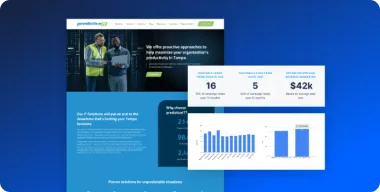More than ever before, social media and the reach it offers companies of all types is a vital component of any good marketing campaign. But many B2B companies, especially in the manufacturing industry are skeptical about its potential uses – and for good reason. The core audience of most social networks is a bit off base from the typical procurement and engineering targets of most sales teams.
After all, when was the last time you heard of a big sale coming through Twitter or Facebook? Despite your misgivings, however, social media has a place in your organization. The key to success is to create a campaign catered to your target audience based solely on your strengths as a company.
Social Media Must Be Customized to Your Audience
Targeting is far and away the most important component of a successful social media strategy in manufacturing. Broad publication on every channel under the sun doesn’t work. It’s unlikely to work in almost any industry except those that directly benefit from wide reach to a generic audience (which is rare).
For this to work, then you need to know where your audience is spending its time online, and it goes beyond preconceptions. Sure, it’s easy to assume that engineers and procurement managers don’t spend time on Twitter or scoff at Facebook, but in reality, they probably spend as much time on any of these channels as you or anyone else – after all Facebook has over 1.3 billion users. That’s one in 6 people…globally. The odds are pretty good your audience is there.
But are they there when working? That’s the key question. How do you find an engineer online when they are working or in “work mode”? How do you connect with someone using the world’s most powerful networking tools at the exact moments when someone is ready to research or make a decision?
It starts with cataloging where they spend their time. For example:
- Engineers – Often desk-bound and focused on key problems, engineers will frequently use social media or related tools to connect with colleagues or discuss common problems in the space. Depending on their background and age, this could mean private groups and forums, or more direct interaction on platforms like Twitter. They also engage in sharing cool stories and projects on sites like Reddit.
- Procurement Managers – Working with sales people all day, every day and thriving based on their ability to find and negotiate the best terms, procurement contacts will use whatever networks are going to net them results. They likely have Facebook profiles and may even utilize their company’s Facebook Page, though likely not often, but are probably incredibly active on sites like LinkedIn.
- Executive Targets – In the executive tier, look for the same high level business interactions that you would expect in any organization. LinkedIn is a good starting point, and depending on tech savviness, this could spread to other more-active social channels.
The bottom line is that broadcasting your message to a wide range of social channels is not an effective way to generate engagement with your target audience. More likely than not, it will result in that wasted time you are worried about. We need to customize.
Key Channels for Industrial Targeting
Of the major social networks, there are only a handful where you’re likely to find routine, ready-made engagement. At the same time, there are other pockets of the Internet where content sharing can result in engagement. Here are some of the places you should consider when building your presence.
- LinkedIn – As the largest professional network in the world, LinkedIn is a good starting point for all B2B interactions. Specifically, industry and professional groups on LinkedIn which are often designed for discussing new research and educational materials (which you can share) are a great place to engage with potential prospects.
- Twitter – Twitter won’t drive new customers but it is a relatively low investment platform on which you can share content, engage with potential partners and customers, and drive traffic to your website. Posting 2-3 times a day (remember these are very short posts), often linking to articles or downloads either on your site or related sites your prospects will find engaging will build that audience and help to generate results.
- Facebook – Facebook works in specific situations. The more directly you are targeting, the better. For example, if you know the company and location of your target prospect, you can create ads here that appear only to a very narrow audience. This, combined with a well-curated Page can allow you to create micro-campaigns that drive traffic back to your site. Wide audience marketing on Facebook is much less effective for manufacturing campaigns.
- Content Sharing Platforms – If you have good content to share, there are a lot of places you can distribute it and drive engagement. Reddit and the manufacturing and engineering subreddits are great examples, as are StumbleUpon, which has an active engineering community, and Instagram, where the right tags and a powerful image can drive engagement even with few followers.
- Engineering Forums – Go to industry specific forums where engineers gather to discuss problems, regulations, cool projects, and more, and you can be a welcome voice there. Get an engineer from within your organization to actively answer questions here – it can help to build authority and drive traffic back to your site.
So where should you avoid spending time? For most organizations, Facebook is a tough investment. In the manufacturing vertical in particular, it’s rare to see success here unless it is incredibly targeted. Other “trendy” sites or low volume sites like Google+, Pinterest, or Snapchat are equally unlikely to drive the kind of engagement you’re looking for as a manufacturing company.
How to Measure Social Media Success
This is one of the most important areas of a good social media strategy. You need to know what success looks like for your organization and how you will measure it. Without these KPIs, it’s easy to get caught up in vanity metrics like number of likes or shares, while avoiding the things that actually matter. These include:
- Visitors to Your Website – If your marketing funnel is setup effectively on your website, traffic has value on its own. How many people visit your site from these social activities?
- Leads Generated – In tandem with visits, how many people convert to leads? If you only get 1-2 leads from social media, but the conversion rate is double what you see from other traffic sources, this is still a good metric. Make sure you compare both together for an accurate sense of what is working.
- Engagement with Top Brands or Thought Leaders – What all of these sites offer that other marketing tactics do not is access. You can interact with top brands and thought leaders in a matter of seconds, asking or answering questions, sharing content, or building rapport that can eventually lead to the types of results you really care about.
- Re-Engagement with Existing Contacts – Using social media, you can more effectively re-engage the people on your list you haven’t heard from in a while. Whether it’s a targeted ad campaign, content specific to the needs they voiced, or just active accounts they are likely to see eventually, this is a major benefit of social media.
On the flip side, what should you ignore? Just about everything else. The followers you have on Twitter or Likes you get on Facebook are nice to have and can make you look pretty good, but if they don’t result in any of the above, they are pure vanity. Think of it this way – if you can pay for them directly (at a relatively low cost), they don’t have significant value.
Social Media Can and Does Work When the Strategy is Concise and Specific
If you create a strategy that is specific to your target audience, their needs, and the places they spend time online, it will be much more successful. Instead of a broad investment in social media that likely won’t generate much response, pick and choose your targets carefully – the results will be measureable.
[scorg_shortcode id=”86113″]






